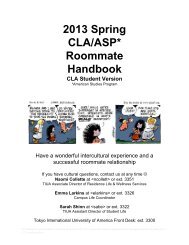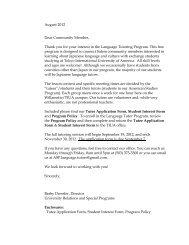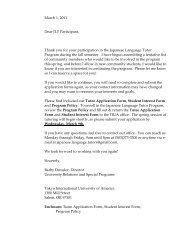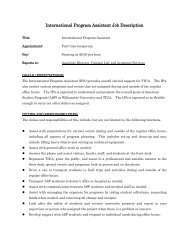American Studies Program 2012 CATALOG - Tokyo International ...
American Studies Program 2012 CATALOG - Tokyo International ...
American Studies Program 2012 CATALOG - Tokyo International ...
Create successful ePaper yourself
Turn your PDF publications into a flip-book with our unique Google optimized e-Paper software.
Observance of Regulations, Policies, and Guidelines<br />
for TIUA (ASP) Participants<br />
(This is a translation of the Japanese version.)<br />
TIUA participants should obey the following regulations, policies, and guidelines:<br />
1. TIUA study abroad program participants are treated as TIUA students as well as Willamette<br />
University students and <strong>Tokyo</strong> <strong>International</strong> University students. Hence, the<br />
participants are considered to belong to three institutions. Therefore, the participants<br />
need to observe not only the regulations, policies and guidance of TIUA and WU, but<br />
also “University Policies” and “Various Regulations” at TIU as TIU students. In other<br />
words, even if the participants are in the U.S., it is often necessary to observe Japanese<br />
laws as well.<br />
2. The major policies are listed below, and some important policies among them are attached<br />
to this “Oath.” The participants and their guardian should read them carefully<br />
and need to swear that the participants will observe the policies of the three institutions<br />
by signing the “Oath.”<br />
3. The participants should understand the meaning of being TIU students, observe<br />
rules, and obey guidelines in order to have a healthy and meaningful student life at<br />
TIUA and WU. It is important to pay attention to the significant differences between<br />
Japan and the U.S. in the sense of the law, social recognition, and social norms<br />
regarding drinking, use of drugs such as marijuana, smoking, and residential life.<br />
Since TIUA students belong to three institutions, they have to obey the policies of<br />
both countries. It is necessary to strongly recognize that if they do not obey the policies,<br />
sanctions of both countries will be applied. For example, drinking is less regulated<br />
in Japan, but is strictly regulated in the U.S. If you violate the drinking policies,<br />
it is normal to be sanctioned. Marijuana is treated much more severely in Japan than<br />
in the U.S., and its use is subject to criminal penalty in Japan. When participants live<br />
in a different culture, they are required to act appropriately in relation to both cultures<br />
regarding these issues.<br />
4. When the participants violate university policies, various regulations, or policies<br />
of any of the three institutions, or violate laws of Japan and/or the U.S., they may<br />
be sanctioned by the appropriate institution. If the participants receive disciplinary<br />
measures, they may lose their qualification to participate in the program even in the<br />
middle of the program. If the disciplinary measures result in suspension or dismissal,<br />
the participants may need to withdraw from the program and may be ordered to return<br />
to Japan.<br />
(J - pg. 39)<br />
Page 24






